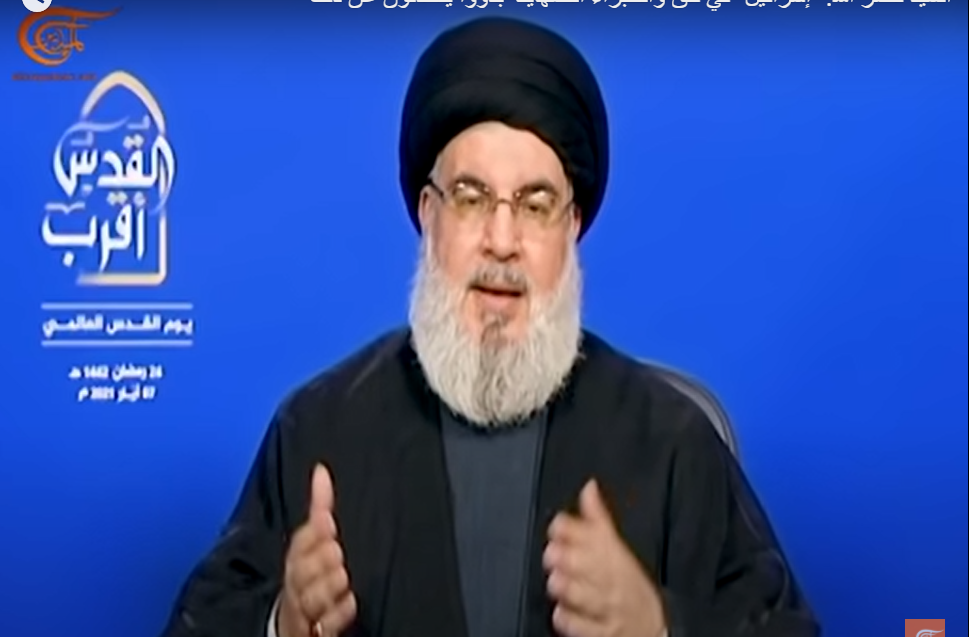Over two weeks have elapsed since Hamas launched an attack on Israeli settlements near the Gaza Strip border.
During this time, Hassan Nasrallah, the Secretary General of Hezbollah, has vanished from public statements.
Sources within Hezbollah assert that the organization closely monitors and actively engages with developments in the Gaza Strip and along the Lebanon-Israel border.
Hezbollah has embarked on a war of attrition against Israel in conjunction with Hamas and the Islamic Jihad organizations in southern Lebanon.
Thus far, Hezbollah has refrained from altering the rules of engagement, avoiding heightened attacks on Israel and steering clear of incursions into Israeli territory.
Nasrallah has kept his promise that his organization will not remain idle while Israel targets Hamas in the Gaza Strip.
This response has left Hamas disappointed, and Khaled Mashal, a senior figure within the organization, has criticized it, stating that “this is not how history is written.”
Hezbollah remains on high alert for potential conflict and may employ its full military might in a surprise attack on Israel once the IDF initiates a ground offensive in the Gaza Strip.
In such an attack, Hezbollah could deliver a substantial blow to Israel by launching thousands of rockets, precision missiles, and numerous drones at strategic targets within Israel while simultaneously attempting to seize territory in parts of the Galilee using the Radwan force.
Israel and the U.S. face challenges in deciphering Hassan Nasrallah’s intentions, and his silence may signify preparations for a major assault against Israel if it crosses his red line and invades the Gaza Strip.
Employing a strategy of ambiguity allows Nasrallah to retain the element of surprise.
As soon as he declared that he would not sit idly by in the face of Israeli actions in the Gaza Strip, he has been engaged in relatively low-profile attacks on Israel while keeping the option of escalation at his disposal.
The Lebanese government is deeply concerned about the potential for a widespread war that could devastate Lebanon entirely.
Despite these concerns, Hassan Nasrallah acts independently.
According to foreign sources, Prime Minister Netanyahu rejected Defense Minister Galant’s proposal for a preemptive strike against Hezbollah, and President Biden also opposed this move.
Netanyahu warned Hezbollah that entering the war would be the mistake of its life, and the price paid would far surpass that of the Second Lebanon War in 2006.
However, Hassan Nasrallah has yet to respond to Netanyahu’s warning.
Hassan Nasrallah may seize the opportunity presented by Israel’s focus on ousting Hamas’s rule in the Gaza Strip to launch a surprise attack on the northern border.
The IDF has a significant presence in that region, but Israel must soon decide how to manage simultaneous fronts in the north and south.
Israel faces a dilemma. On one hand, it must deal a severe blow to Hamas, topple its rule, and secure the release of abductees.
On the other hand, an opportunity has arisen to address the significant threat posed by Hezbollah to settlements along the northern border and Israel’s interior, given its substantial arsenal of missiles and rockets.
Iran established the formidable Hezbollah as a deterrent, equipping it with tens of thousands of rockets, missiles, and drones to protect against potential Israeli attacks on nuclear facilities. The question now arises: will Iran change this goal and deplete Hezbollah’s weaponry in an attempt to salvage Hamas’s rule in the Gaza Strip from collapsing?
There is no definitive answer to this question. General Ismail Ka’ani, the commander of the “Quds” force of the Iranian “Revolutionary Guards,” visited Lebanon to coordinate positions with Hassan Nasrallah.
Israeli and American intelligence agencies have thus far failed to discern Nasrallah’s intentions.
Consequently, Israel must prepare for the worst-case scenario to avoid being caught off guard.




